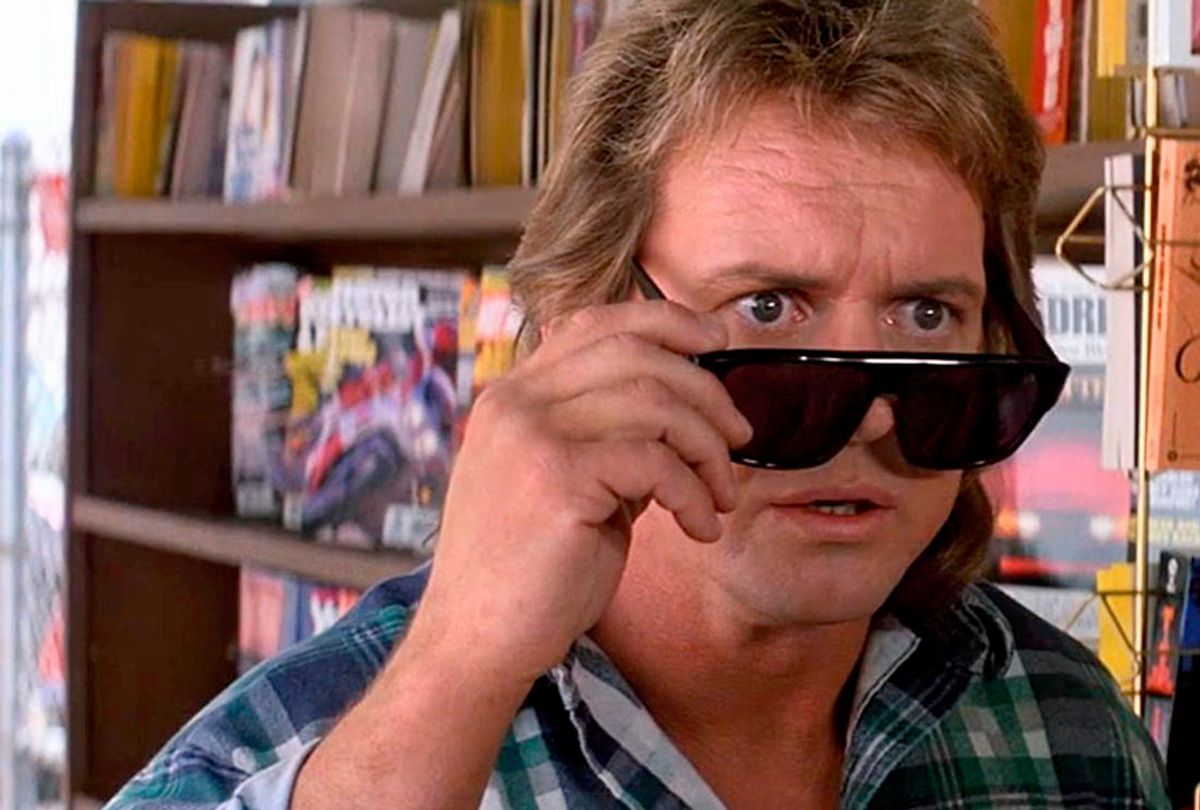The idea was simple: Create sunglasses that block digital TV screens. A Kickstarter was born. Media buzzed. IRL Glasses were born. (IRL = In Real Life, natch.)
Imagine a pair of sunglasses that block TV screens! My mind went wild. As a fan of the real world and a lover and rememberer of the analog years pre-internet, I find myself unplugging more and more. Could these glasses block out the daily bombardment of digital ads in public space?
I backed the Kickstarter, and in early March, my new IRL Glasses arrived in the mail. I haven’t been this excited for a new toy since I bought a 1976 Cadillac Seville (that was analog, too). I immediately put the glasses on indoors, and went to look at the TV.
The TV, a newer digital, high-def screen, looked like it was turned off.
Except it was on. I could hear the dialogue of "In the Heat of the Night" (I’m also a sucker for pre-second-millennium television).
But the screen? As black as if it were turned off.
I was thrilled. I got out my phone. Alas, I could see my iPhone perfectly.
My MacBook Air computer screen was also still visible with the IRL glasses on.
Of course, the glasses came with a warning that they wouldn’t work on phones or most computers. But in my mind, I wanted them to work everywhere I looked. In the back of a movie theater, for example, when everyone in the rows ahead has their phones out. Those bright glows are distracting. Of course I wanted those blacked out, too.
But I could accept the glasses weren’t going to work that way. I found solace in that they would at least block TV screens. So I spent a week traipsing around the Midwest, expecting my world to be rocked by sunglasses (they really do work as sunglasses, too!).
Except it dawned on me, on a cruise around Detroit: There simply aren’t a lot of digital TV screen ads in the Midwest. Not like, for example, New York City.
So I went to New York. First stop, Times Square.
I walked across 42nd Street, approaching from the East. Except, none of the screens were blacking out. None.
As I got closer to the tourist trap, I started passing banks with TVs in the windows. Incredibly, from afar, the glasses worked, but the closer I got to the bank, it was as if the glass of the bank’s windows made the glasses useless: I could see the TVs through the glass, with weird waves through them.
Disappointed, I walked deeper into the advertising hell that is Times Square, and all of the ads were clear. None were blocked out by the glasses, even above the subways — though the sizzle reel ad for the glasses showed how those ads were blocked.
Bummed. Foiled. So sad they didn’t work, I walked on to my destination: a diner on 9th Avenue and 44th Street.
This particular diner has been around for decades, but has fallen into having TVs in the corners, for sports or the news or whatever New Yorkers must pay attention to at any given time. Incredibly, they all looked like they were off. I took the glasses off to see CNN on one screen and the Knicks on another. I put the glasses back on and voila!the screens magically disappeared and the TVs looked like they were off.
Awesome. This, I could get used to.
I called Ivan Cash, the artist and founder of IRL. Cash’s pal Scott Blew invented the first pair of IRL in a rudimentary way, and Cash took it up into larger production, inspired by the 1988 cult classic movie "They Live." ("They Live" is “a prophetic movie,” says Cash, where the sunglasses show the truth behind all the billboards and marketing.)
“I view advertising as a social plague,” Cash says. “The proliferation of screen time is deserving of critique. Americans spend over 10 hours per day staring at a screen, and see over 5,000 advertisements per day.”
He apologized they couldn’t block out all screens, or Times Square, and stressed the company offers a refund to anyone expecting more from the glasses than what was delivered. He pointed out the glasses do work on some digital subway advertising. I confessed my hopes were much too high — I really want something that will block out all screens. IRL Glasses do work on the majority of LCD TVs and do in fact darken screens — making computer screens much more comfortable to look at. And I understand getting one lens to block out all screens is a tough task that probably requires more investment than a Kickstarter.
It’s hard, he says, to come up with a universal lens that blocks all screens: “we could spend a year working towards one screen, and there’s no guarantee it will block them all.”
The tech is moving faster than the blocking technology — even though IRL works with the same people working on VR and Oculus tech.
But IRL Glasses really are, as Cash says, a “provocative statement piece.”
And they do fulfill his goals of inspiring “hope and optimism and to empower people to control technology.”
“We as citizens deserve something like this,” says Cash. “I don’t care if it’s IRL or some other company. We’re not far from moths at a light. The way we behave is changing rapidly. Tech is amazing. Modern medicine is great. But there aren’t enough checks and balances.”
Who wants to be controlled by technology anyway?

Shares